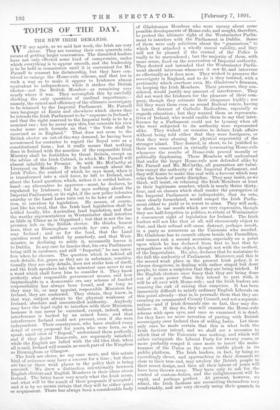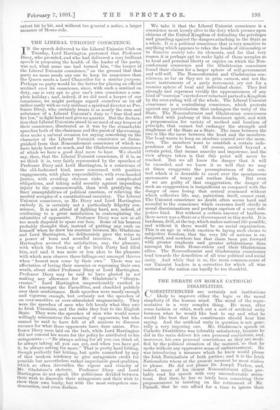TOPICS OF THE DAY.
which everything is to appear smooth, and the leadership accustomed for centuries to regard the Royal veto as a that they were abusing the physical superiority of the constitutional form ; but it really means that nothing stronger island. They desired, in short, to be justified to done in Ireland with the sanction of the responsible Irish their own consciences in virtually terminating Home-rule Ministry shall be forbidden by Great Britain, except on whenever the results of Home-rule proved morally or the advice of the Irish Cabinet, in which Mr. Parnell will Politically displeasing. These Members will understand almost infallibly be Premier. So with Mr. McCarthy at that under the larger Home-rule now defended alike by Liverpool on Monday. He is frank enough about the Mr. Parnell and Mr. McCarthy, all guarantees are value- Irish Police, the control of which he says must, when it less except the authority of the Imperial Parliament, and is transformed into a civil force, be left to Ireland, and they will desire to make this real with a fervour which may about the Land question, which, unless it is settled before- relax the bonds of party discipline. They may insist, as we hand—an alternative he approves—must, he declares, be think, will insist, on retaining the Irish Members at least regulated by Irishmen ; but he says nothing about the in their legitimate number, which is nearly thrice thirty- Imperial Parliament, or its right, if the new police tolerates four, and on clauses which shall render the prerogative of anarchy or the Land Laws turn out to be laws of confisca- the Imperial Parliament so indisputable, that its veto, once clearly to interfere by legislation. He means, of course,nce clearly formulated, would compel the Irish Parlia- ment either to yield or to resort to arms. They will seek-,just like his rival, that the Irish land legislation shall be settled locally, like Australian land legislation, and that in short, to use words which are very expressive, though the worthy representatives in Westminster shall interfere they are half-forgotten in politics, to retain at Westminster as little in Ulster as in Gippsla,nd ; but that is not the im- a concurrent right of legislation for Ireland. The Irish pression left on the British elector. He thinks, honest leaders will not like that at all, will strenuously object to man, that as Birmingham controls her own police, so that, and their refusal will cause distrust, perhaps revolt, may Ireland ; and as for the land, that the Land in a party as numerous as the Unionists who seceded. question must be settled by somebody, and that West- Mr. Gladstone has to consult others beside the Parnellites, minster, in declining to settle it, necessarily leaves it and cannot risk a second secession, especially on a point to Dublin. In any case he fancies that, his own Parliament upon which he has declared from first to last that he being still in existence, and still "Imperial," he can inter- sympathises with the object, though not with the method, fere when he chooses. The question which is behind all of the Imperialists. He, also, declares that he maintains to such details, for, grave as they are in substance, constit u- the full the authority of Parliament. Moreover, and this is tionally they are only details, does not strike him of itself, the second weak place in the present Irish policy, it is and the Irish speakers take the minutest care never to say always dangerous, in dealing with rather stupid but dour. people, to raise a suspicion that they are being tricked. If a word which shall force him to consider it. They know perfectly what responsible government means, and how the English electors once fancy that they are being done impracticable in a democratic era any scheme of limited out of more power than they intend to part with, it responsibility has always been found, and so long as will be all over with Home-rule ; and the Irish leaders are they may be, or may appoint, responsible Ministers for running the risk of raising that suspicion. It has been immensely difficult to satisfy ordinary English Liberals on Ireland, they are contented. They obtain, they know, in that way, subject always to the physical weakness of this point already—that is, to persuade them that they are Ireland, absolute and uncontrolled authority. Anybody creating an ornamented County Council, and not a separate nation—and if Irish demands rise so fast, they may dis- may have the legal right to interfere with their Ministers, because it can never be exercised, except, indeed, when believe it. If they do, they will examine the Home-rule scheme with open eyes, and once so examined it is dead, interference is backed by an armed force, and that interference Ireland could not prevent, even if she were for they have no more intention of parting with British independent. Their countrymen, who have studied every sovereignty over Ireland than of selling India. Let them detail of every proposal for years, who were born, so to only once be made certain that this is what both the speak, amid cries of " Repeal," understand them perfectly, Irish factious intend, and we shall see a secession to and if they desire Home-rule, are supremely satisfied ; which that of the Unionists was nothing, and which will while the English are lulled with the old idea that, when either extinguish the Liberal Party for twenty years, or all is said, Ireland will remain as much part of the Kingdom more probably compel it once more to insert the main- as Birmingham or Glasgow. tenance of the Union as the most visible plank in its The Irish are clever, we say once more, and this astute public platform. The Irish leaders, in fact, by being so kind of reticence may have a success for a time ; but there exceedingly clever, and approaching in their demands so are two or three weak places in the policy that is being close to their true end, may awaken the British people to pursued. We drew a distinction intentionally between their secret design, and then all their labour of years will English electors and English Members in their ideas about have been thrown away. They have only to ask for the Ireland. The latter know very nearly what the Irish mean, control of custom-duties, and the enlightenment will be and what will be the result of their proposals if accepted ; rapid, and perhaps perfect. At present, however, we and it is by no means certain that they will be either quiet admit, the Irish factions are reconciling themselves very or acquiescent. There has always been a considerable body comfortably, and are very cleverly using their quarrels to of Gladstonian Members who were uneasy about some possible developments of Home-rule, and sought, therefore,, to protect the ultimate right of the Westminster Parlia- THE NEW IRISH DEMANDS. ment to interfere with the Parliament in Dublin. Some WE say again, as we said last week, the Irish are very of them were only solicitous about the " guarantees," to clever. They are turning their own quarrels into which they attached a wholly unreal validity, and they means of getting larger concessions. The disunited leaders will not be pleased if the control of the Police is have not only effected some kind of compromise, under really to be surrendered ; but the majority of them, with more sense, fixed on the reservation of Imperial authority. is to be held in commission until it is convenient for Mr. They desired and intended that the Westminster Parlia- Parnell to reassert his dictatorship, but they have con- ment should intervene whenever it saw fit, and intervene to enlarge the Home-rule scheme, and that too in trived as effectually as it does now. They wished to preserve the such a way as to make it appear to Irishmen almost sovereignty in England, and to do it they insisted, with a p equivalent to independence, while it strikes the British pertinacity which overbore even Mr. Gladstone's firmness, elector—not the British Member—as remaining very on keeping the Irish Members. Their presence, they con- nearly where it was. They accomplish this by carefully sidered, would justify any amount of interference. They shirking the only questions of cardinal importance,— did not want the Irishmen for the pleasure of their com- namely, the extent and efficiency of the ultimate sovereignty pany, though they estimate their eloquence highly ; nor to be retained by the Imperial Parliament. Mr. Parnell did they want them even as sound Radical voters, having uses language at Ennis and elsewhere which shows that a latent distrust of Catholic Radicalism, especially as he intends the Irish Parliament to be " supreme in Ireland," regards education ; but they wanted them as representa- and that the right reserved to the Imperial body is to be a tives of Ireland, who would enable them to say that inter- nominal one ; but he never says this, but conceals his view ference by a Parliament could not be tyranny when all under some such formula as that " the Veto shall be who were subjected to its authority were represented exercised as in England." That does not seem to the alike. They wished on occasion to debate Irish affairs British elector an out-of-the-way demand, he having been without being told either that they were foreigners, or t accustomed for centuries to regard the Royal veto as a that they were abusing the physical superiority of the constitutional form ; but it really means that nothing stronger island. They desired, in short, to be justified to done in Ireland with the sanction of the responsible Irish their own consciences in virtually terminating Home-rule Ministry shall be forbidden by Great Britain, except on whenever the results of Home-rule proved morally or the advice of the Irish Cabinet, in which Mr. Parnell will Politically displeasing. These Members will understand almost infallibly be Premier. So with Mr. McCarthy at that under the larger Home-rule now defended alike by Liverpool on Monday. He is frank enough about the Mr. Parnell and Mr. McCarthy, all guarantees are value- Irish Police, the control of which he says must, when it less except the authority of the Imperial Parliament, and is transformed into a civil force, be left to Ireland, and they will desire to make this real with a fervour which may about the Land question, which, unless it is settled before- relax the bonds of party discipline. They may insist, as we hand—an alternative he approves—must, he declares, be think, will insist, on retaining the Irish Members at least regulated by Irishmen ; but he says nothing about the in their legitimate number, which is nearly thrice thirty- Imperial Parliament, or its right, if the new police tolerates four, and on clauses which shall render the prerogative of anarchy or the Land Laws turn out to be laws of confisca- the Imperial Parliament so indisputable, that its veto, extort bit by bit, and without too general a notice, a larger measure of Home-rule.











































 Previous page
Previous page